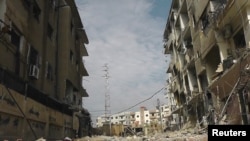UNITED NATIONS —
U.N.-Arab League Special Representative Lakhdar Brahimi warned Friday that if a negotiated political settlement is not found for Syria, it could become a "failed state" with all the repercussions that entails.
Veteran diplomat Brahimi told the U.N. General Assembly that he is "convinced" that there are only two alternatives in Syria.
The first is the formation of a political process that leads to the creation of a new Syria that ends the bloodshed and satisfies the aspirations of the people. The second option is that Syria descends into the chaos of a failed state, with all the domestic, regional and international implications that entails.
"Naturally, nobody wishes to see a failed state in Syria," Brahimi said. "Nobody wants to see the state and its institutions withering away, lawlessness spreading, warlordism, banditry, narcotics, arms smuggling, and worst of all, the ugly face of communal and sectarian strife take hold of Syria."
Brahimi added that in order to avoid this dire prediction, there is only one option - that the international community should work together for a negotiated political process.
Brahimi, who was appointed as Joint Special Representative in August after former U.N. chief Kofi Annan quit the post in frustration, has spent most of the past three months traveling in the region. He has been working towards formulating his strategy for trying to end the crisis which has claimed some 40,000 lives.
After visiting the region, Brahimi said Friday that he does not think there is consensus there to put together a workable peace plan. He said that leaves only one option - the United Nations, and in particular the Security Council.
Brahimi acknowledged that it has been difficult for the 15-nation council to reach consensus on Syria so far, but said he believes they can do it.
"Any peace process must include necessarily a binding agreement on the cessation of all forms of violence," he explained. "As I said earlier, there is no trust between the parties and for fighting to stop. A strong, well-planned observation system must be put in place. Such observation can best be organized through a large, robust peacekeeping force - and naturally that cannot be envisaged without a Security Council resolution."
Brahimi said a recent coming together of various opposition groups into a single force is one step in the right direction toward a political process.
Syria's U.N. Ambassador Bashar Jaafari said his government agrees with Brahimi that a political, not a military, solution must be found. Jaafari said some countries want the instability to continue so they can undermine the government and exercise their own political agendas.
Veteran diplomat Brahimi told the U.N. General Assembly that he is "convinced" that there are only two alternatives in Syria.
The first is the formation of a political process that leads to the creation of a new Syria that ends the bloodshed and satisfies the aspirations of the people. The second option is that Syria descends into the chaos of a failed state, with all the domestic, regional and international implications that entails.
"Naturally, nobody wishes to see a failed state in Syria," Brahimi said. "Nobody wants to see the state and its institutions withering away, lawlessness spreading, warlordism, banditry, narcotics, arms smuggling, and worst of all, the ugly face of communal and sectarian strife take hold of Syria."
Brahimi added that in order to avoid this dire prediction, there is only one option - that the international community should work together for a negotiated political process.
Brahimi, who was appointed as Joint Special Representative in August after former U.N. chief Kofi Annan quit the post in frustration, has spent most of the past three months traveling in the region. He has been working towards formulating his strategy for trying to end the crisis which has claimed some 40,000 lives.
After visiting the region, Brahimi said Friday that he does not think there is consensus there to put together a workable peace plan. He said that leaves only one option - the United Nations, and in particular the Security Council.
Brahimi acknowledged that it has been difficult for the 15-nation council to reach consensus on Syria so far, but said he believes they can do it.
"Any peace process must include necessarily a binding agreement on the cessation of all forms of violence," he explained. "As I said earlier, there is no trust between the parties and for fighting to stop. A strong, well-planned observation system must be put in place. Such observation can best be organized through a large, robust peacekeeping force - and naturally that cannot be envisaged without a Security Council resolution."
Brahimi said a recent coming together of various opposition groups into a single force is one step in the right direction toward a political process.
Syria's U.N. Ambassador Bashar Jaafari said his government agrees with Brahimi that a political, not a military, solution must be found. Jaafari said some countries want the instability to continue so they can undermine the government and exercise their own political agendas.




![Anti-Syrian regime protester holds up Arabic placard reading: "the victory fingers over the [presidential] palace," during a demonstration, at Binnish village, in Idlib province, Syria.](https://gdb.voanews.com/21d9d9fa-2b58-4d9e-8c38-846f6ad40394_cx0_cy6_cw0_w250_r1_s.jpg)
